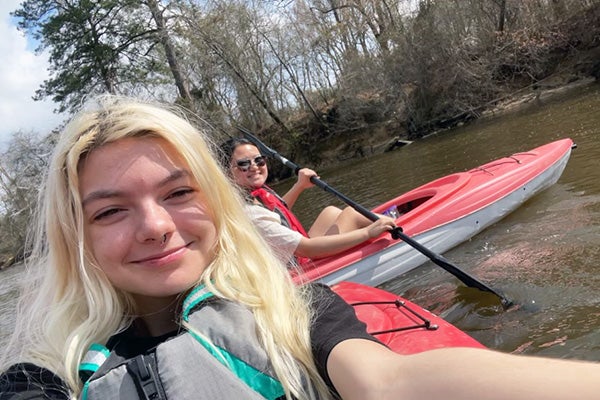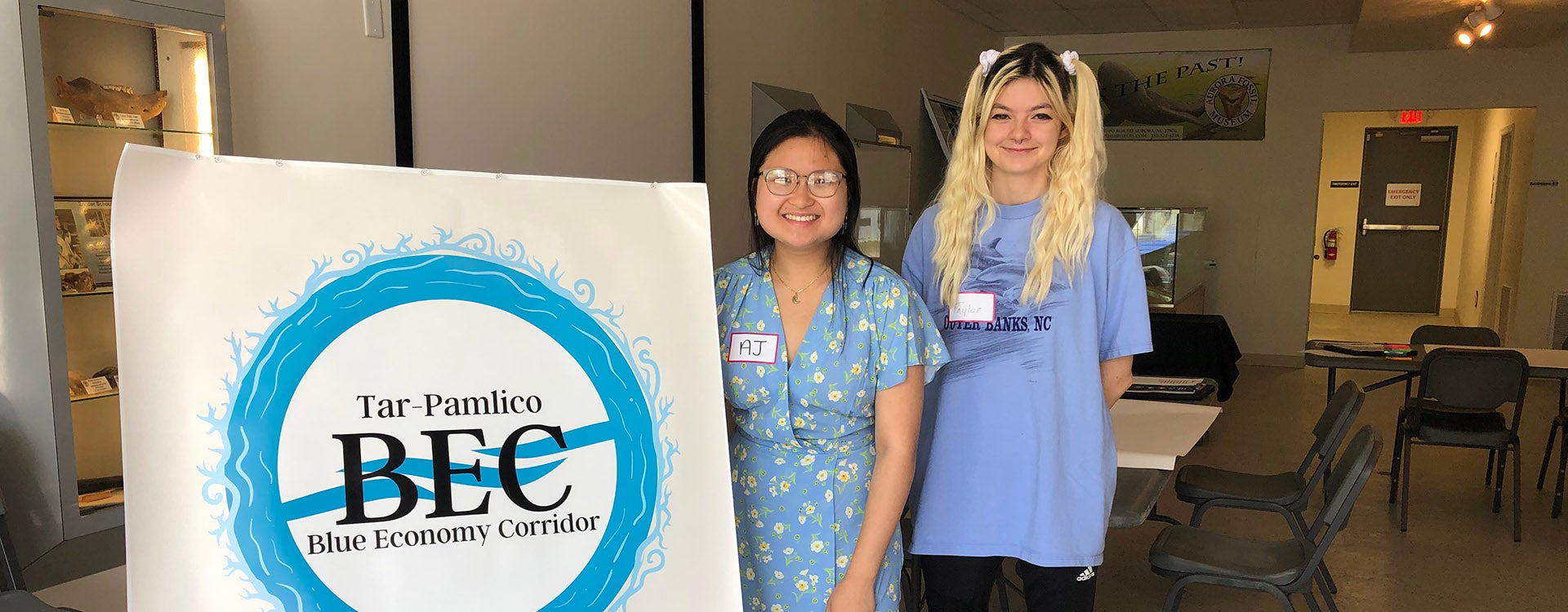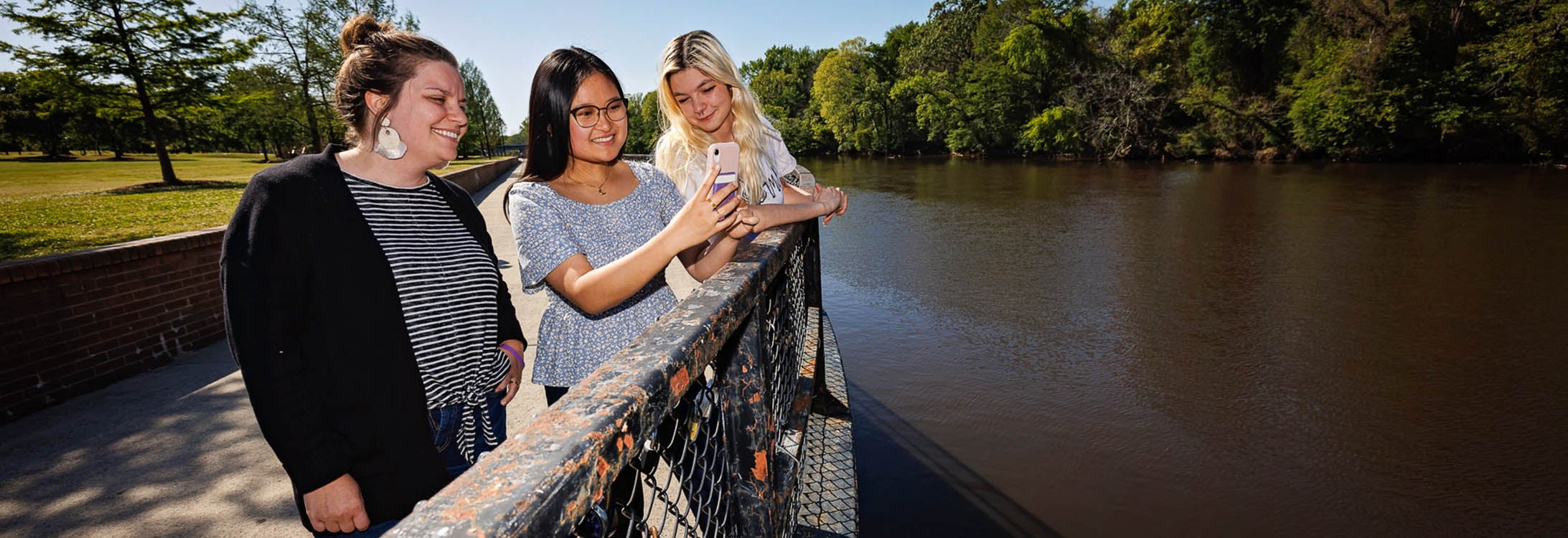RESEARCH CONNECTION
Program fosters mentoring relationship, opportunity to explore new ideas
For many aspiring college students, being able to participate in research projects as an undergraduate is a huge draw. With East Carolina University’s status as the only university in North Carolina with a medical school, dental school and college of engineering and technology, opportunities for students to immerse themselves in research are endless.
The university’s Division of Research, Economic Development and Engagement offers a variety of ways to work with researchers across campus, including the Engagement and Outreach Scholars Academy (EOSA), which connects faculty members, graduate and undergraduate students across disciplines to participate in community-engaged research.
2022-23 EOSA COHORT
The Division of Research, Economic Development and Engagement announced the new cohort of EOSA faculty members in April. They are:
- Dr. Myshalae Jamerson-Euring, College of Allied Health Sciences
- Dr. Christine Kowalczyk, College of Business
- Dr. Travis Lewis, College of Education
- Dr. Shirley Mai, College of Business
- Dr. Carol Massarra, College of Engineering and Technology
- Dr. Mitzi Pestaner, College of Nursing
- Dr. Linda Quick, College of Business
- Dr. Aimee Smith, College of Arts and Sciences
“The power of collaboration between universities and their external partners is evident in programs like EOSA,” said Dr. Sharon Paynter, assistant vice chancellor for economic and community engagement. “Engaged research results in projects that address community-identified needs and at the same time provides students opportunities to use analytical and technical skills gained in classroom settings and offers faculty avenues to bring their technical expertise to bear on real-world challenges. At ECU, about half of sponsored programs involves this type of community-engaged research.”
Every year, the second-year EC Scholars enroll in HNRS 3100, a research internship class where they partner with the faculty and community partners involved in EOSA. For some students this is their first chance to participate in research at the university level. It also gives them a chance to develop a mentor relationship with faculty who may not be in their degree program.
Anjalee Hou, an economics major, and Taylor Cash, a biology major, are second-year EC Scholars who have built rapport with Dr. Emily Yeager, an EOSA faculty member and assistant professor in the College of Health and Human Performance’s recreation sciences department. They have decided to continue working with Yeager as part of their required signature honors project even after the EOSA experience ended.
“In the beginning, since we didn’t know a lot about EOSA, I was a little scared because you have all of these faculty projects,” Hou said. “It really works out in the end, where they’re opening you up to new perspectives. I think that’s the biggest part of it that we overlook where we’re expecting EOSA to be something that fulfills a niche that we specifically want but I think the whole point of EOSA is to get you out and find something new.”
Yeager’s research focuses on asset mapping the eastern Tar-Pamlico Blue Economy Corridor (BEC), which includes all the communities along the river from Rocky Mount to Washington. The World Bank defines the blue economy as sustainable use of ocean resources for economic growth, improved livelihoods and jobs, and ecosystem health, encompassing activities from tourism to renewable energy.
“The goal is to create a digital interactive map that would display all of these cool resources that the community tells us exist,” Yeager said.
There are seven kinds of assets Yeager’s team is interested in identifying:
- Nature-based tourism, such as kayaking, fishing and wildlife viewing
- Hospitality
- Socio-cultural heritage
- Science, technology, education, arts and math (STEAM)
- Americans with Disabilities Act accessibility
- Conservation assets
- Public health
“We are trying to cross-promote other things that people are doing, but also maybe identify a few things people have not really thought of before, something that can improve your quality of life,” she said.
Yeager developed her interest in the Tar River at a young age. She grew up in Franklin County near the Tar River’s headwaters, where she played as a child with her dad. Then, she moved to Greenville, where she pursued her bachelor’s and master’s degrees.
“Greenville is actually the place where I learned to kayak, and I would fish when I was in school here, but I still took it for granted,” she said.

As part of their research, Anjalee Hou and Taylor Cash take trips with Dr. Emily Yeager to experience some of the assets they are mapping in the BEC. One of these was kayaking the Tar River with Knee Deep Adventures and Sound Rivers. (Contributed photo)
While she pursued her doctoral degree in Georgia, she dreamed of coming back to eastern North Carolina as a professor at ECU.
“When I came back, I decided to go to some of my old stomping grounds on the Tar and Pamlico rivers,” she said. “The thing that I noticed was that these communities had some cool things going on which all related back to returning to the water. There was this historical retreat from waterways when you had the export of manufacturing elsewhere so now, I’m seeing how they’re revitalizing these spaces or turning them into places you can live, work and play.”
While Yeager is pursuing her passion, she encourages Cash and Hou to also pursue things they are interested in.
“She’s really, really supportive and lets us take the lead,” Cash said. “If we want to learn how to use a certain program, she’ll offer to train us in it.”
An example of this is the ArcGIS software. Neither student knew how to use it before working with Yeager. Now, they not only have completed maps for the BEC research but have started using the software in biology classes as well
“From day one, I don’t think there’s a single thing Dr. Yeager has said no to us about and she’s always so supportive of any questions,” Hou said.
They regularly get coffee with Yeager and discuss their futures and ask her advice on resumes, graduate programs and more. They are not the only ones reaping the positive benefits of the mentor-mentee relationship.
“Being encouraged to be involved with my students so much was such a lifeline,” Yeager said. “They’re so inspirational and seeing them lifted up and hearing their stories about what they learned and feeling confident — that’s all you want at the end of the day, for the students to feel like they learned something and it was a value.”
One of the major projects that Cash and Hou have assisted with is the creation of social media accounts to promote the BEC, which was a new experience for them. They also learned valuable skills in literature review and graphic design.
“For me, while I’m econ, I’m also pre-med,” Hou said. “I’ve been mainly focusing on medical stuff and trying to find clinical research, so it’s been super fun working with Dr. Yeager on something that pertains to my econ major and things I’ve learned in class. I finally see the real-world applications to it.”
The next stage of the project is conducting community workshops in Nash, Edgecombe, Pitt and Beaufort counties to ask local residents what they believe are important assets in their community. These workshops build on a survey that was sent out to about 8,000 residents who live in and near the river basin. Once the final workshop is completed on May 22 at the Tarboro campus of Edgecombe Community College, Yeager and her team will analyze the data with the goal of making the asset map live in the fall.
“It’s a community development tool,” Yeager said. “That’s what we hope to do. Some people can use it for marketing, some could use it for economic development, whatever they want to do, but I was so inspired by everything that was happening in these communities along the waterways and wanted to see what people thought about it.”

Hou and Cash helped Dr. Emily Yeager host the community workshop in Beaufort County.
